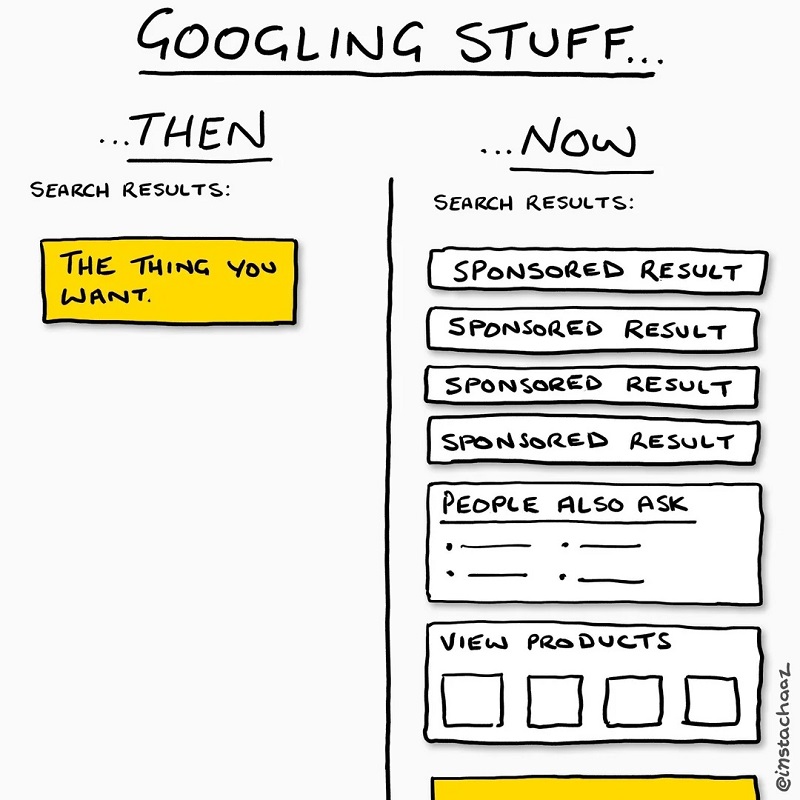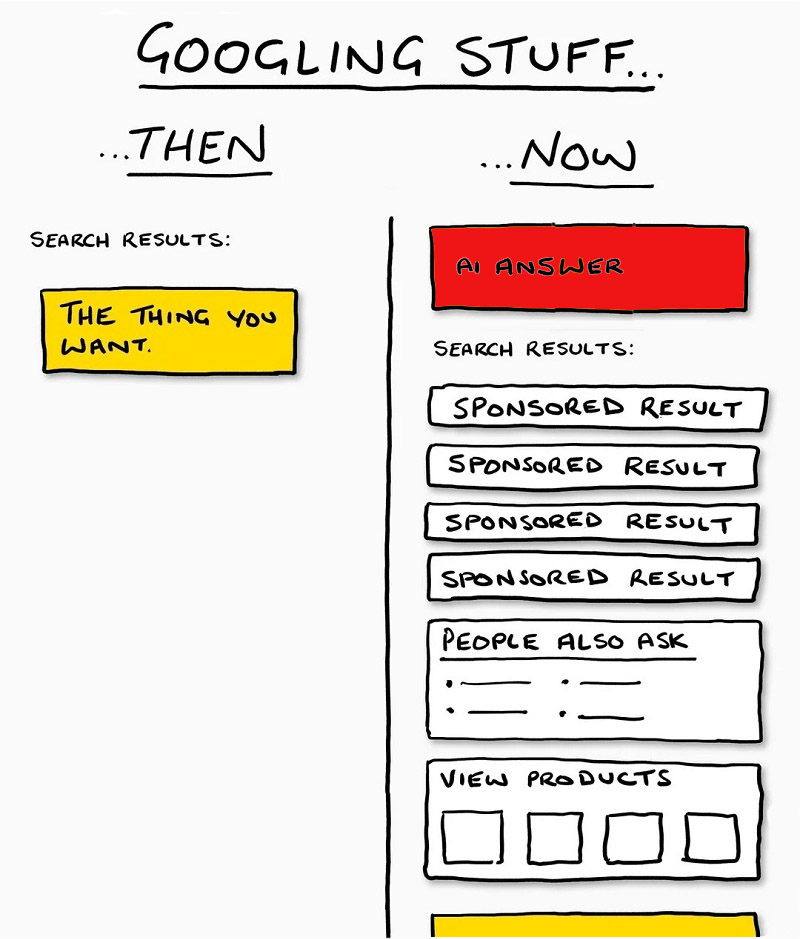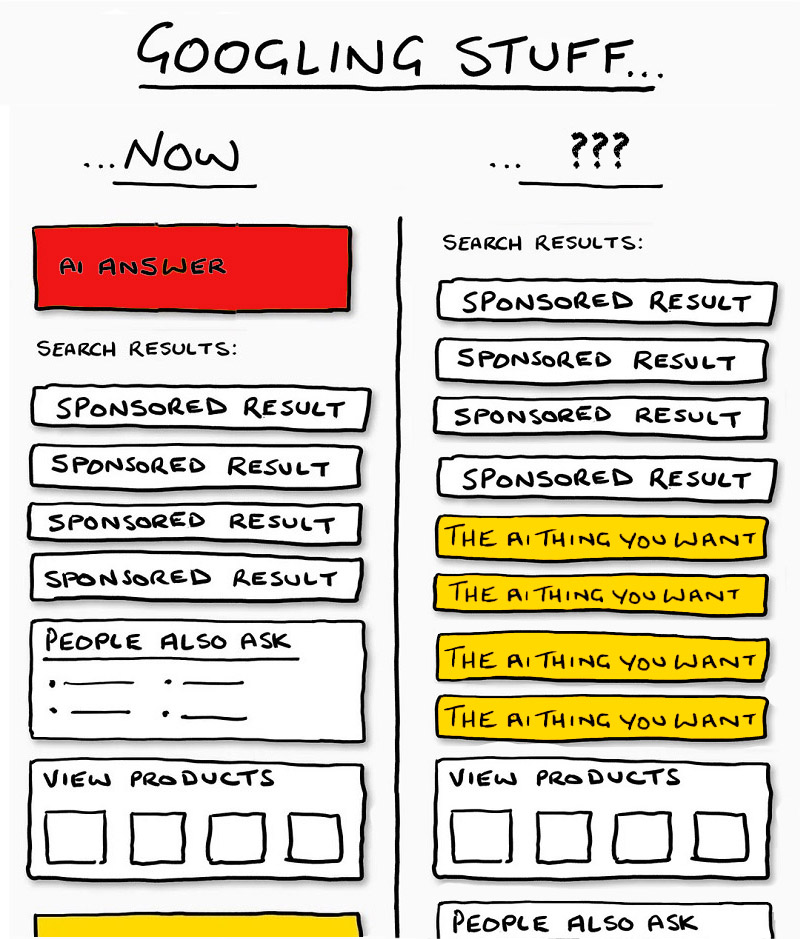How Google could save its business model
AI first – Part 1: Google’s role in the age of AI, the future of content marketing and an endangered business model
Can you feel it too? We are part of a turning point in history.
We are affected and we are users, we are observers and we are creators. We are experiencing that much of what was familiar until recently is now being shaken up. Artificial intelligence (AI) is challenging many areas of life and turning entire sectors of the economy, companies and the way we work upside down. Many feel that the past two years have been profound. And that the next few years will possibly be even more profound.
This is the beginning of a series of articles in which I would like to offer different perspectives on artificial intelligence. This is not a self-contained analysis, but rather a subjective snapshot. An invitation to think along with me. The perspective of a sceptical optimist or an optimistic sceptic. Someone who wants to see the opportunities, but still has more questions than answers.
I can’t say yet how many parts this series will have. Maybe three, maybe more. Part 1 focuses on content marketing and the role Google could play in order to continue playing a role in the future.
Really impressive, Google!
Have you adidast this week? Or mercedest? Probably not. But maybe you’ve already googled?
Google has achieved something unique. Since 2004, ‘googling’ has been listed in the Duden dictionary as a synonym for searching the Internet with a search engine. [1] No other brand has achieved this. Not Adidas. Not Mercedes. Not even Apple, Microsoft or SAP.
Some companies have succeeded in establishing their products to such an extent that they are synonymous with entire product categories. Tempo stands for tissues, Uhu for glue. However, ‘Tempo machen’ (to speed up) has nothing to do with blowing your nose, and “Uhu” is not an activity. ‘Googling,’ on the other hand, is a verb. It stands for an action and is firmly anchored in our active vocabulary. But will ‘googling’ continue to be an integral part of our professional and private lives in the future? I have my doubts…
In 2024, Alphabet Inc., Google’s parent company, generated total revenue of around 350 billion US dollars. Of this, approximately 264.6 billion US dollars came from advertising, in particular Google Ads, which accounts for by far the largest share of revenue. [2] Wow! Who wouldn’t want to swap places? But what happens when search behaviour changes fundamentally and advertising revenues collapse? [3]
The dark side of Google and the true motivation of searchers
For many marketing experts, Google is a means to an end. It is a machine that directs interested people to the content of their own website. To achieve this, texts, graphics, podcasts and videos were created that were designed to rank as highly as possible for selected keywords, and search engine optimisation (SEO) was crowned the secret supreme discipline of marketing.
Over time, Google has not only continuously changed the basics for good rankings – often announced in the course of minor or major updates, but never actually backed up with truly reliable information or concrete instructions – but also its appearance:

Figure 1: Googling stuff … then … now [4]
This is a major problem for many content producers: a few years ago, they could expect around 60 percent of traffic per keyword if their content ranked organically in first place. Today, it’s usually only ten percent, and in second place, it’s just over six percent; so, out of 100 people interested in a specific piece of information, at best, ten people will land on the world’s best page on that topic. Ouch!
Let’s flip the coin and take a look at the other side: what do people who search for information on the internet actually want?
- Either they are looking for an answer to a specific question, but don’t want to trawl through 1,000 sources with virtually identical information.
- Or they are looking for information on a topic, but usually with a general, fundamental interest. People who are interested in football news, for example, will visit a sports portal and consume the news that catches their eye.
Searchers therefore go to familiar sources or google and then usually forget where they found the information, simply because it is not really important to them. Exceptions prove the rule.
And now artificial intelligence enters the stage.
A world with many new competitors
It sounds like a joke from digital history: Google, the company that once revolutionised access to global knowledge, is now being overtaken by technologies that it played a key role in developing. We are talking about large language models (LLM), the eloquent machine minds that not only generate text but also provide answers before you have even finished asking the question. And the irony? It was Google that laid the foundation for this development with the publication of the Transformer paper in 2017. [5] Almost by accident, the tech giant forged the tool for its own demise, a bit like a homeowner leaving burglars a step-by-step guide, complete with a copy of the keys.
While Google was busy optimising search results down to the last pixel and monetising ad space in micro steps, others seized the opportunity. OpenAI, Anthropic, Mistral [6] and all the others are springing up like mushrooms, not least because they have understood what searchers really want: answers, not links.
Despite their sometimes painfully obvious weaknesses, such as hallucinations, outdated or invented data, or a disarming self-confidence despite complete cluelessness, these systems have built up a considerable fan base in a very short time. Why? Because they deliver on one crucial point: they are there when you need them. No cookie banners, no SEO-optimised scroll deserts, no three-minute loading times.
Google, on the other hand, suddenly looks like a giant with a heavy backpack, laboriously trying to save its business model in a future that it itself has accelerated. And how is the giant responding to this acceleration? With a me-too strategy!
What Google is doing and why a me-too strategy is suboptimal
Google has introduced AI mode:

Figure 2: Googling stuff with a generated AI response
AI mode is a new feature in Google Search that fundamentally changes the classic search experience. Instead of displaying a list of links to websites, AI mode provides a generated answer to every question. A search engine becomes a dialogue-oriented assistant.
To put it kindly, this is a me-too strategy; less kindly, the galactic global market leader is copying an idea that even its competitors are currently unable to profit from. Let’s take a closer look at three problems with this strategy:
Google is hallucinating.
AI mode hallucinates just like other large language models. What is already difficult to accept with ChatGPT is much more serious with Google. Users rightly expect reliable information, not experimental dialogues. A company that has stood for reliable search results for decades is now itself providing inaccurate or incorrect answers. Ouch!
Advertising revenues are plummeting.
AI mode has a major side effect: it makes advertising redundant. If the answer appears directly at the top – visually dominant, in natural language, without any context from the sources – why should searchers click on paid links? According to internal estimates, Google’s advertising revenue has already fallen by around 15%. And that’s just the beginning.
Traffic to websites is drying up.
People search for information, content creators generate information, and Google ensures that this information can be found. This tacit agreement has existed for many years. And website operators who wanted to speed up the process could attract more people to their content by throwing money at it. It was a simple model that worked well for most of those involved.
However, AI mode is putting an end to this global collaboration. Not only are advertising revenues plummeting, but website visitor numbers are also falling sharply. [7] Why should information seekers navigate to the content of a website when Google uses the content of websites to generate an answer?
But what could Google do instead of this suboptimal me-too strategy?
What Google could do
For search engine optimisers, writing meta descriptions for individual pieces of content is nothing new. These descriptions are usually displayed when search engine results are shown. What probably not all information seekers know is that if the content of a website matches the search query but the meta description does not, Google displays a text excerpt from the website below the hit instead of the meta description. This gives searchers a more meaningful reference.
This is exactly what Google could do! Instead of placing a generic answer above all other information, AI mode could use the dedicated content of individual web pages as a source for individual information per search query and hit. And if this information is even wider than the currently recommended approx. 920 pixels or longer than approx. 145 characters, real added value is created at a glance!

Figure 3: Googling stuff with multiple AI responses generated based on specific content
- Hallucinations are eliminated because the answers are generated specifically using existing information from individual website content.
- Anyone who needs further information can navigate to the original source as usual. This benefits website operators, advertisers, searchers and Google alike.
- People are looking for answers, not links. At the same time, people are used to links. They are the connecting element on the internet. Their use does not need to be learned, and the form of use does not determine the quality of the information that follows a click.
- Google uses its extensive knowledge to rank content, secures its investments in the existing technical landscape and strengthens its brand essence. [8]
And last but not least, Google secures its primary business model, which is based on advertising revenue, as well as the discipline of content marketing. Pretty cool, right?
Is this Google’s Nokia moment?
Google is facing a major challenge: the market is changing. New players are entering the field and, in some cases, redefining the rules of the game. Its own business model is under pressure. What to do? Is this Google’s Nokia moment, which students will discuss in 20 years’ time and ask how Google, the Internet giant, disappeared from the scene?
I don’t have a definitive answer to this question. If I were to google it, I would hardly find a meaningful answer. A language model would formulate a plausible-sounding answer, but how reliable it would be is another matter entirely. In any case, I believe that Google can save its own business model and continue to play an important role in competition and everyday Internet use by displaying multiple AI-generated answers based on existing website content. At the same time, this secures the basis for content marketing, because only when content leads to clicks does it make sense for website operators to produce content.
Outlook
This was part 1 of the ‘AI first’ series. In part 2, I will take a look at the impact of artificial intelligence on the world of work and our jobs. How will selected activities change, will we keep our jobs, and what strategies might companies pursue?
Notes (partly in German):
[1] Wiktionary: googlen
[2] GoogleWatchBlog: Umsätze und Gewinne in 2024
[3] In addition to advertising, Google generates revenue from cloud services, subscriptions such as YouTube Premium and its own hardware such as Google Pixel. Projects such as Waymo (autonomous driving) and Verily (health) currently contribute only marginally to revenue.
[4] Chaz Hutton: Googling stuff … then … now
[5]The Google research team ‘Google Brain’ published the groundbreaking paper Attention Is All You Need at the ‘Neural Information Processing Systems’ conference in 2017, in which the Transformer model was presented for the first time.
[6] OpenAI is a US AI research company known for models such as GPT (ChatGPT), DALL-E and Sora. Anthropic is a US AI start-up founded in 2021 by former OpenAI employees. Anthropic is known for its language model Claude and is supported by investors such as Amazon and Google (!). Mistral AI is a French AI company founded in 2023. Mistral takes an open-source approach and aims to democratise AI technology.
[7] Interestingly, the number of impressions of websites often remains stable, which is a nice indication that impressions are a pattern without value.
[8] In fact, this could also allow Google to prominently display conflicting information rather than just the same content in different words on different websites.
If you like the article or would like to discuss it, please feel free to share it in your network. And if you have any comments, please do not hesitate to send us a message.
Michael Schenkel has published other posts on the t2informatik Blog, including:

Michael Schenkel
Head of Marketing, t2informatik GmbH
Michael Schenkel has a heart for marketing - so it is fitting that he is responsible for marketing at t2informatik. He likes to blog, likes a change of perspective and tries to offer useful information - e.g. here in the blog - at a time when there is a lot of talk about people's decreasing attention span. If you feel like it, arrange to meet him for a coffee and a piece of cake; he will certainly look forward to it!
In the t2informatik Blog, we publish articles for people in organisations. For these people, we develop and modernise software. Pragmatic. ✔️ Personal. ✔️ Professional. ✔️ Click here to find out more.


